Peter MALONE
Betty Blue/ 37.3 le matin
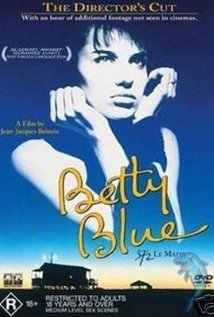
BETTY BLUE/ 37.2 LE MATIN
France, 1986, 180 minutes, Colour.
Jean- Jacques Anglade, Beatrice Dalle, Gerard Darmon, Consulo de Haviland, Clementine Celarie, Jacques Mathou, Vincent Lindon, Dominique Pinon.
Directed by Jean- Jacques Beineix.
Betty Blue became something of an instant cult classic in 1986 when it was first released. It received wide acclaim, award nominations including formal the Oscar for Foreign Language picture. It made the career of its star, Beatrice Dalle, who continued her career though her personal life was very erratic. The male star of the film, Jean- Jacques Anglade had a very successful career in French cinema.
The director’s cut is 180 minutes longer than the original 1986 version.
The film shows the rather ordinary lives of some ordinary people, the jobs, the relationships, the disappointments, the challenges. Anglade portrays Zorg, a man who was a plumber, has jobs as a truck driver, but has also a written manuscript kept in several boxes. He likes writing but is self-deprecating. He also loves words.
Into his life comes a very young woman, vivacious but erratic, Betty Blue. She moves in with Zorg, and the film shows a great deal of the intimate passionate relationship, erotic scenes, a great deal of frank nudity, but highlighting the ordinariness of this couple. They have mixed experiences, aggravated especially by Betty’ moods, outbursts, insulting people, finally setting fire to the house in which they live.
They move in with friends and all seems to be becoming normal. Betty discovers the manuscript, reads it all night, decides to type it and submit it to publishers, which she does. At first there are no responses, then negative responses, including one editor who is accosted at home by Betty who slashes his face, Zorg then discussing the issues with a sympathetic policeman and using standover tactics to get the editor to withdraw his charges.
They live with another couple who are friends, work in the pizza restaurant, moving south when the mother of the owner of the restaurant dies. She sold pianos and Betty and Zorg move in, selling some pianos, making friends with neighbours, and Betty discovering she is pregnant to Zorg’s delight. However, she finds that she is not really pregnant, goes into further depression, gouges out an eye, is in hospital – and Zorg, who cannot live without her, smothers her in the hospital. He continues his writings.
The film was directed by Jean- Jacques Beineix, who had made an impact with Diva and followed this with Moon in the Gutter. In his later career move towards making documentaries.
1. The titles? The alternate title, Betty Blue? Nominations, Oscar nomination, acclaim? Cult film?
2. The version of 1986, 120 minutes? The Director’s cut, 180 minutes? The favourable comments for the Director’s cut?
3. A French story, ordinary people, that lives, jobs, relationships? Borderline sanity? Repercussions? Tragedy?
4. The cast, in French cinema?
5. The opening, the sexual relationship, erotic, passion, nudity, frank ordinariness? The repetition of sexuality scenes and nudity throughout the film?
6. Zorg, his age, experience, truck driving, hard work, transport? Betty coming into his life, the relationship? Living in the house, the interiors, the rooms? His bosses? The issue of the painting of the houses? Betty helping? The prospects? Discovering his manuscript, his love for writing, his talk, vocabulary, and his work as a plumber?
7. Betty, her age, experience, pressures on her as a waitress, her leaving, the bosses? Moving in with Zorg, loving him? Imposing, in the house, her work? The former boss, the relationship, Zorg’s new boss, insults, the paint over his car, her moods?
8. The domestic sequences, meals, tidying, her unpredictability, the decision to leave, setting fire to the house?
9. Her reading the manuscript, her response, enthusiasm, the hard-work in typing the manuscript, packaging, posting, waiting for the responses?
10. Her friendship with Lisa? Moving in? Life with her? Eddie and Lisa as a couple? His work at the pizza house? Their work, waiting, Betty and her tantrums with the customers, making the pizza from the garbage and watching?
11. Waiting for the responses, Eddie and Zorg reading them, unfavourable? Betty finding out? Confronting the editor, her attacking him, the slash? Zorg going to the policeman, sympathetic, wanting his own work published, listening? The law? Zorg’s idea, confronting the editor, the standover tactics, withdrawing the complaint?
12. Eddie, his mother dying, driving to the town, the funeral, the shop for pianos, playing the piano?
13. The decision to stay, Zorg and Betty moving in, their friendship with Bob, his wife and the baby, the shop and the customers? The wife, her advances on Zorg? Bob trying to deal with the situations?
14. The day of the sale of the piano, attention, the sale? The second sale, the need for the truck, the machinery, driving, the policeman holding them up, Zorg and his discussions with the policeman, sympathetic?
15. Betty, believing she was pregnant, Zorg welcoming this, caring for her, tenderness, the test, and not being pregnant?
16. The depression, gouging out her eye, in the hospital, Zorg visiting, the doctors and the staff, his desperation, no prospects for her life, his smothering
her, for love?
17. Zorg, going back to his typewriter, his talent, writing, drawing on his experiences…?
Jimi: All is By My Side
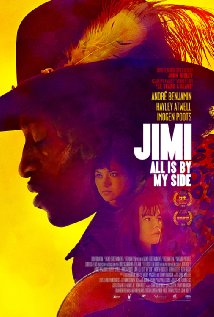
JIMI: ALL IS BY MY SIDE
UK/US, 2013, 118 minutes, Colour.
Andre Benjamin, Hayley Atwell, Imogen Poots, Ruth Negga, Andrew Buckley, Adrian Lester, Oliver Bennett, Tom Dunlea.
Directed by John Ridley.
Jimi Hendrix was well-known in the 1960s and in succeeding decades. This film shows a short period in his life, the mid 1960s. He had moved from the United States to Britain, was caught up in the atmosphere of the swinging 60s in London, playing in some small venues, discovered, getting an agent, forming a trio, performances, moving to success with the Jimi Hendrix Experience.
Andre Benjamin portrays Jimi Hendrix and was praised by critics for his performance and communicating the spirit of the subject. ImogenPoots? is Linda, from a wealthy background, the girlfriend of the Rolling Stones, Keith Richards, taking an interest in Hendrix, promoting him, finding a manager. However, she found a rival in Jimi Hendrix’s affections in Kathy, Hayley Atwell, from a different class, a different style of person, who is able to relate to Hendrix – although, commentators note that she said there was never any violence towards her though it is dramatised in this film. The other female interest in his life is ida, portrayed by Ruth Negga who introduces him to ideas of Black Power so prevalent at the time, embodied in the UK in the person of Michael X, played by Adrian Lester.
The film is of more interest to music fans and those who want to know more about the personality, the talent and the career of Jimi Hendrix.
1. Jimi Hendrix, his talent, music, career, reputation, death?
2. Audience knowledge of him, appreciation, music and performance? The film not having permission to reproduce his music as such? Relying on suggestions and evocations?
3. Biography, portrait, fictional aspects, playing with the facts, especially as regards to his violence towards Kathy? His relationships? The value having a drama for incorporating fictional aspects as truth?
4. The visual style, the period, the mid 1960s, the UK, the US, costumes, decor, the visualising of various popular celebrities?
5. The music, instruments, performance?
6. Jimi, his background, US, life, music talent, plane, the ensembles, solo, guitar skills, the venues, the various introductions, performance, responsive audiences, the trio, the touch of laziness, agents, publicity, tours, the Monterey Festival? The Jimmy Hendrix Experience?
7. Linda, her relationship with Keith Richards, the Rolling Stones, British, the affluent family background, a family and a groupie? Listening to Jimi, her interest, support, discussions, offering opportunities, promotion? Losing out in his interest to Kathy? The relationship with the Stones? Arranging the manager, his handling the situation, coping or not?
8. Kathy, in herself, her lifestyle, different class, the contrast with Linda, the relationship, sex, love, the company and Jimi, the range of friends, the entourage, his touches of jealousy, their attitude towards Linda? Jimi and his violent attack on her?
9. Ida, Jimmy and his fascination, the issues of Black Power, his rejecting the ideas? His visit to Michael X, the discussions, the consequences?
10. The Jimi Hendrix Experience, preparation, the booking for Monterey? On the verge of success?
11. Jimi Hendrix later career, music, instruments? The end?
Arthur and the War of Two Worlds
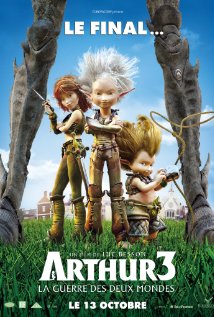
ARTHUR AND THE WAR OF TWO WORLDS/ ARTHUR ET LA GUERRE DES DEUX MONDES
France, 2010, 101 minutes, Colour.
Freddy Highmore, Ron Crawford, Penny Balfour. Voices of: Selena Gomez, Jimmy Fallon, Iggy Pop, Lou Reed.
Directed by Luc Besson.
This is an immediate continuation of the second film in the series by Luc Besson, animated, the world of Patrice Garcia. In this story, Maltazsard been able to transform himself into human, super high size, and threatens the local town, wanting absolute power. He is confronted by Arthur, Princess Rainier and Betameche, voiced by Freddy Highmore, Selena Gomez, Jimmy Fallon.
There are amusing adventures in the confrontation between the very tall Maltzard and the reduced hero, ending with their mutual transformations and the defeat of Maltazard – with his son Darcos, voiced by Iggy Pop, becoming involved. But, the defeat of the evil villain, the security of the Minimoys, and a good future for Arthur means a happy ending.
Plot: Following the second film of the series, Maltazard has assumed human size, and left Arthur in miniature. Accompanied by Selenia and Betameche, Arthur attempts to retrieve an enlarging potion from his house, which Maltazard seizes to enlarge his followers, whereafter Arthur returns to human form using an Elixir of Life given by a queen bee. Archibald convinces Darkos, Maltazard's son, to change sides, and enlarges him with a second potion. Arthur and Darkos then confront Maltazard, until Selenia and Betameche shrink Maltazard back to his Minimoy size and Arthur captures him, while the U.S. Army overcome Maltazard's forces. Maltazard thereafter remains a prisoner of Arthur's family. (Wikipedia summary).
Arthur and the Great Adventure
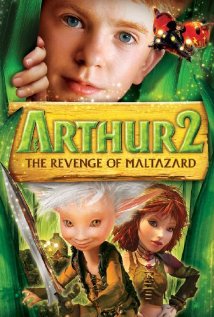
ARTHUR AND THE GREAT ADVENTURE/ ARTHUR ET LA VENGEANCE DE MALTHASARD
France, 2009, 93 minutes, Colour.
Freddie Highmorel, Mia Farrow, Robert Stanton, Penny Balfour, Ron Crawford. Voices of: Selena Gomez, Jimmy Fallon, Omar Sy, Snoop Dogg, Lou Reed.
Directed by Luc Besson.
This is the second part of Luc Besson’s animated fantasy of the stories of Arthur, from the work of Patrice Garcia. The releases of parts two and three were different in different parts of the world, the original French version and the dubbed English version, sometimes combined, sometimes distinct. They did not break any box office records.
The setting is the United States in the 1960s, with Arthur, Freddy Highmore continuing, undergoing rituals with the tribal men, in the steps of his grandfather, Ron Crawford, to the exasperation of his father, Ron Stanton, and the bewilderment of his mother, Penny Balfour. His father wants to take him back to the city but he escapes from the car, goes back to the Minimoys and is transformed, entering into their world to confront Malthasard. Lou Reed has taken the place of David Bowie as the voice of Malthasard. Selena Gomez has taken the place of Madonna as the voice of Princess Serenia.
Plot: In 1963, protagonist Arthur stays with his grandparents for the holidays, during which the Bogo Matassalai (a fictitious African society) assign Arthur a series of tests including camouflage and environmental nonviolence. Having passed these tests, Arthur prepares to see the Minimoys to celebrate, until his father decides to take him and his mother back to the metropolis. When a spider gives Arthur a grain of rice containing a distress-call, which he believes has come from the Minimoys, he returns to his grandparents' house, where the Bogo Matassalai's attempt to give him Minimoy stature through a telescope fails, and they instead wrap him in vines of increasing tightness until he falls in a drop of sap into the Minimoy Max's bar. En route to investigate the Minimoys' condition, Arthur and Max rescue Betameche, who leads Arthur to the King. He then learns that Selenia is held by Maltazard, who is inspired to invade the human world by increasing his own size. Maltazard tricks the Minimoys into completing this design. The telescope itself is destroyed in the process, leaving Arthur trapped at his Minimoy size. (Wikipedia summary).
Rush Hour 2
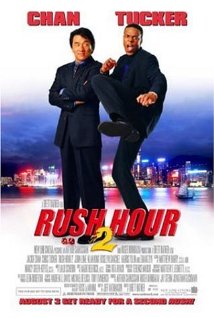
RUSH HOUR 2
US, 2001, 90 minutes, Colour.
Jackie Chan, Chris Tucker, John Lone, Ziyi Zhang, Roselyn Sanchez, Alan King, Harris Yulin, Kenneth Tsang, Don Cheadle, Jeremy Piven, saul Rubinek.
Directed by Brett Ratner.
Now, I realise my mistake. I saw Rush Hour on a plane and it seemed just a run of the mill detective story comedy in LA, except that Jackie Chan's stunts are always exciting and worth watching and that Chris Tucker (who was so irritating in The Fifth Element) is irritating here. The ads are saying 'another rush', but I wasn't in a hurry to see this sequel. It gradually won me over. It must have been the big screen.
This time we open in Hong Kong, which really looks wonderful. The Triads are active and this is less than wonderful, especially as bombs go off in the American embassy. Chris Tucker is simply wanting a good time in Hong Kong (with some extraordinary sexist attitudes and behaviour) but Jackie gets him involved. After several entertaining set pieces of martial arts and acrobatics, they find themselves in Las Vegas for some more martial arts and acrobatics and some Tucker comedy which I found I was tolerating more. Villains include John Lone, Alan King and, on her Hollywood way after The Road Home and Crouching Tiger, Zhang Ziyi. There is a comic turn from Don Cheadle as an African American become Chinese, Jeremy Piven as a gay attendant in a clothing store, Saul Rubinek as a weary assistant in a casino. As usual, the outtakes during the final credits are worth seeing.
1. The popularity of the first film? Police buddy film? Chinese and African- American?
2. The Hong Kong settings, aspects of the city? The Los Angeles settings? Las Vegas? The musical score?
3. The popularity of Jackie Chan, his films, action, stunts, personality, comic touches? The contrast with Chris Tucker, loud, the touch of the narcissistic, preoccupied with women, as detective, intruding, ultra-extrovert?
4. Carter on holidays, interactions with Lee, looking for women, not adapting to Hong Kong culture, his poor pronunciations, flirting, with the gangsters, the woman with the chicken?
5. The basic crime plot: explosions at the American embassy, undercover agents killed, the smuggling, the American police, wanting help from Hong Kong but excluding Lee and Carter? The revelation of Ricky Tan, his past involvement with Lee, especially with Lee’s father, the attempt to bribe him, killing him? His boat, using Steve Reign, henchman, women? The laundering of the money? The other undercover agents?
6. Carter, his intrusion at the club, confronting the gangsters, at the sauna and massage, the fights? The film’s reliance on fights, Jackie Chan and continued involvement, Carter and his involvement, the style of the fights and choreography?
7. The Hong Kong officials, the local police, discovering Isabella, the undercover agent? Her presence on the boat, receiving the money, the fears that the parcel was a bomb, her saving lives, shooting, the final fight?
8. On the boat, Ricky Tan being shot? His reappearance in America? The Casino, the money, hidden in the Chinese statues? Laundering at the casino? Reign, trying to take the moulds, Tan stabbing him?
9. Hu Li, deadly, the explosions, the confrontations, violence, the final fights, with the bomb and explosion?
10. The encounter with the African- American and his absorbing everything Chinese? His help?
11. Infiltration, going to the clothing store, the gay attendant, the clothes, going to the club?
12. The diversion, Carter and his loud performance at the tables, complaints? Lee getting in, the surveillance?
13. The ultimate fights, the brawling, explosions, leaping to safety? The commendations?
14. The humour of the out-takes?
Larry Kramer in Love and Anger
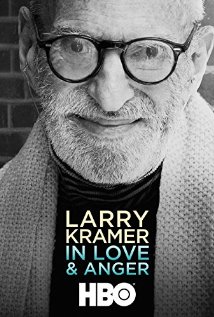
LARRY KRAMER IN LOVE AND ANGER
US, 2015, 82 minutes, Colour and black and white.
Directed by Jean Carlomusto.
This is a documentary well worth seeing.
Larry Kramer, born in 1935, is well-known in the United States as a film writer (Women in Love), a novelist (Faggots) and as a strong activist, co-founder of Act Up, in the cause of AIDS.
The film introduces him, seemingly an extreme strident figure, hammering audiences with the idea that AIDS is a plague that was being ignored, especially by the Reagan Administration and Ed Koch, Mayor of New York. He was to continue this kind of protest, loud demonstration, action in the streets, the giving of talks, television interviews, writing articles and books for several decades.
Perhaps he is best known in theatre and television circles with his play The Normal Heart. This documentary has sequences from the initial performance in the 1980s, from a revival in 2011 and from the television film with Mark Ruffalo as Ned Weeks, the alter ego of Larry Kramer.
The film takes the audience back with photos and commentary to his childhood, the shy boy, feeling isolated as a homosexual, early experiences, in college, with the witness of other students at college and universities at the time and the sense of isolation.
After some time working in the film industry, and this film has the long except of the nude wrestling scene between Oliver Reed and Alan Bates from Women in love, noting how it was a breakthrough sequence in 1970. But, it is pointed out that Larry Kramer works best for himself, not with a group, and he moved out of the film industry and wrote his novel Faggots, which received some favourable views but many hostile reviews, especially from homosexuals.
He went to work in England where he found he was much more accepted and able to develop his craft and his ideas.
One of the strong points from Larry Kramer, all through his career, and subject to strong critique from other gay writers and critics, is his taking a stance against mere sex for sex’s sake, the “meat rack” mentality that he derides, the focus on the physical rather than an exploration of emotions, love, deeper commitment to others. He became much more explicit several years after the release of the novel in 1978 with the spread of AIDS. He is particularly rueful in recent years that with medication to combat AIDS, there has been a return to some hedonistic recklessness in homosexual behaviour.
He became personally involved in the campaign about AIDS in the 1980s, speaking, the production of his play, with a variety of groups – with some of the members find him so exasperating that he was expelled.
Nevertheless, he has continued over the decades, often an abrasive figure, but with a strong message.
In the latter part of the film, he has health complications and is seen in hospital, especially with the director of the film, building up to a marriage ceremony in hospital with his longtime partner, David Webster.
Kramer is an interesting figure in himself, a challenger to the administration – with many scenes and interviews with Anthony Fauci, who headed the government’s drug program, who debated often with Kramer, but also pays tribute to him in pressurising the development of the drugs which ultimately we used to combat AIDS.
Kramer is an interesting figure in the American arts, theatre, and counter-culture.
Only the Brave
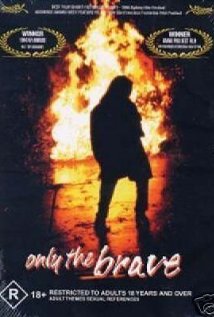
ONLY THE BRAVE
Australia, 1994, 59 minutes, Colour.
Elena Mandalis, Doris Kaskanis, Maude Davey.
Directed by Ana Kokkinos.
This film won the Best Short Film award at the Melbourne Film Festival as well is the Best Australian Short. It was also screened in Venice and other festivals.
It is a portrait of two girls in Melbourne’s western suburbs (with Greek backgrounds). It is a sharply drawn picture of drab life, a family hardship, struggles with personal and sexual identity. It is well-acted and perceptively written.
In fact, with the small budget and shorter running time, one would like it to be longer with more detail on some of the characters, especially the parents. It is a strong Australian drama.
Director Ana Kokkinos went on to direct Head On, adapted from the novel by Christos Tsiolkas, 1999, and The Book of Revelation in 2009.
1. An award-winning short film? The career of the director?
2. The Melbourne setting, the western suburbs, homes, school, the streets, the open spaces? The drab aspects? Musical score?
3. The title, the reference to the two girls, realistic and ironic?
4. The portrait of Alex: her age, experience, life at home, her mother and the clashes, her father? At school? The support of Kate? The books, Alex reading the special book at school and Kate’s upset? Her friendship with Vicki, Vicki’s situation and her sympathy? Vicki wanting her to run away with her? Her pyromania? Alex and her mother having left? Her boyfriend, not sleeping with him, clashing with friends in her circle? Her writing, love of words and images? Going to Kate’s house, seeing her lover? Running away? Her seeing Vicki abused? Her reaction? The decision to run away, packing, the photo of herself and her mother, seeing Vicki and the fire, going to the top, trying to rescue Vicki? Alex and her burns, waking up in the hospital, the books from Kate, the visit from her mother? The red dress on the fence, Alex moving on?
5. Vicki, disturbed, at school? The pyromania? Vicki jealous of Alex and Kate? Vicki wanting Kate to run away, the disappointment? The father and his molestation, explicit, shameful for Vicki, surprise for Kate? Vicki running away, Alex supporting her, but Vicki setting fire to the school library, on the top of the industrial platform, Alex unable to save her, burning to death?
6. Kate, her work at the school, interest in Alex, lending the books, her personal relationships, her partner, her reprimanding Alex for going too far?
7. Vicki's father, the sexual abuse, audience disgust?
8. Alex's parents, the absent mother, the photo, her turning up?
9. How realistic a slice of life, objective? Or a world perceived by the two young girls?
Much Ado About Nothing/ 1993

MUCH ADO ABOUT NOTHING
UK, 1993, 111 minutes, Colour.
Kenneth Branagh, Emma Thompson, Richard Briers, Denzel Washington, Keanu Reeves, Kate Beckinsale, Brian Blessed, Phylida Law, Imelda Staunton, Jimmy Yuill, Robert Sean Leonard, Michael Keaton, Ben Elton, Patrick Doyle, Richard Clifford.
Directed by Kenneth Branagh.
Much ado about Nothing is one of Shakespeare’s bright plays. And Kenneth’s treatment emphasises brightness and the like this. It was filmed in the sunshine of Tuscany.
Kenneth Branagh still in his 20s, had directed a version of Henry V in 1989. While he directed contemporary stories like Peter’s Friends and Death Again, he directed himself in Hamlet in a full text version. His other Shakespearean films are Love’s Labours Lost, with a musical score from the popular songs of the 1930s, and As You Like It, set in Japan.
While Branagh has adapted the text, he has kept the spirit of the drama, the repartee, especially between Benedict and Beatrice, and included the musical turns.
He has assembled a very fine cast, with Thompson and himself in the leads, Richard Briers, appears in many Branagh films, is the father with Kate Beckinsale as his daughter. Denzel Washington is a surprise choice as the Prince, with Keanu Reeves as his villainous brother. Robert Sean Leonard is the suitor. And, for popular comedy, there is Michael Keaton as Dogberry with Ben Elton as his assistant.
A very entertaining Shakespearean film.
1. Kenneth Branagh bringing a popular Shakespearean play to the screen? Its tone, light, romantic, betrayal? Subtext of political hostility? An all’s well that ends well story?
2. The use of the text, editing, Kenneth Branagh’s choices? Language, the style of delivery, straight, comic? Conversational? The songs?
3. The editing of the film and its effect?
4. Tuscany, the countryside, light and sunlight, the mansion, the grounds, the mountains in the background? The beautiful photography? Most of the action outside? Overhead shots? The fluidity of the photography, the opening and the ending with long single takes?
5. The plot and characters? Benedick and Beatrice? In themselves? He in the military, she part of the family? The verbal jousting, scoring off each other? Their listening to the talk about themselves, about being in love with each other, the shock, believing it? The continued clashes, but love? And the decision to help Hero?
6. Claudio, his brother, his love the Hero? Ursula and Margaret in the household? The other members? The tragedy, his believing the story against Hero? The truth? His rage? The plan, Hero as dead, the truth to be revealed?
7. Leonardo and his brother, the friar, talking about Benedick and his love?
8. Ursula, Margaret, the women, talking about Beatrice in love?
9. The Prince, his arrival, Claudio and the entourage, everyone happy, Claudio and his love for Hero, the celebration, the plains for the marriage?
10. Don John, the evil brother, dark and sinister, his associates, the plan to trap Hero, his friends, the arrangement with Margaret, the Prince and Claudio witnessing the lovemaking? Don John and Monica?
11. The Prince and Claudio, the elements of their denunciation, the later revelations, the change of heart?
12. The comedy with Dogberry and his assistant, manner of talk, pretending to ride the horse, presenting the case, the evidence, the notary, Dogberry being insulted as an ass? The confessions of the criminals?
13. Margaret, the realisation of what had happened, grief?
14. Don Jon, the return, his arrest?
15. The preparation for the marriage, Claudio’s consent to marry the cousin, the revelation of the truth, happiness?
16. Benedict and Beatrice, accepting the reality, the plan to marry, their future?
17. Shakespeare, style, verse and poetry, romance and comedy, and a sense of humanity?
Last Five Years, The
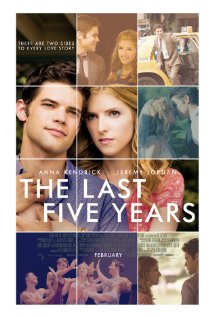
THE LAST FIVE YEARS
US, 2015, 90 minutes, Colour.
Anna Kendrick, Jeremy Jordan.
Directed by Richard La Gravanese.
This film is based on a musical play by Tony-award winner, Jason Roberts Brown. It has been directed by celebrated writer and director, Richard La Gravenese (Living Out Loud, P.S.I Love You, Freedom Writers).
The stars of the film are Jeremy Jordan as an up-and-coming Jewish novelist and Anna Kendrick as a struggling actress. The film shows the progress of their relationship over five years – but, with the songs for Anna Kendrick moving in chronological order forwards and Jeremy Jordan’s songs beginning from the end and moving towards the beginning. The plotline moves to the halfway point and the proposal.
Some audiences will find the film very difficult to sit through, 95% of it sung.
Both the actors are pleasant screen personalities and Anna Kendrick has sung in the Pitch Perfect films as well as sometimes Into the Woods.
1. The style of film? Music, song, drama, the staging of the songs, dance, performance? A different kind of film genre?
2. The style of the music, piano accompaniment, orchestra? The recitatif style of the singing?
3. New York, New Jersey, Ohio – a piece of Americana?
4. Anna Kendrick as Cathy? Jeremy Jordan as Jamie? Age, personalities, the range of songs, style of singing? Solo, duet?
5. Cathy and Jamie as characters, their age, the different backgrounds, their experiences, falling in love, their lifestyles, the tensions, different careers, infidelity, the break?
6. The possibilities of their staying together?
7. The title, the opening with Jamie leaving, the chronology, moving backwards and forwards, the dramatic effect, understanding each of the characters, their love, the break?
8. The opening, Jamie and his leaving, and the reference to the past years?
9. Cathy in herself, love, the past, talent, singing, the range of auditions, the performances in Ohio, the grinning dancers, West Side Story, the Sound of Music? The effect on her, going to New York, the range of auditions, lining up, the many girls, the people auditioning, listening or not? The song with her recitatif of all that was happening in herself and with the people auditioning? Not being able to perform in New York? Support of Jamie’s career, the build-up to the wedding and the ceremony, not able to support Jamie fully, going to the book readings, not wanting to go to the parties, the clash? His leaving?
10. Jamie as a character, a writer, success, the readings, the parties, the effect on him, his wanting support from Cathy? The importance of the communication song, Skyping each other and illustrating their love?
11. What went wrong? Could the relationship be fixed? Possibilities could talk, listening – and not listening? Jamie and his women?
12. The goodbye song, yet still loving, Cathy arriving and going into the building?
13. The effect of the experience, the importance of the music, the singing, the revelation of character, situations, regrets?
West of Memphis
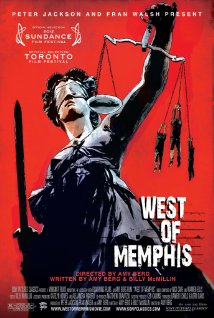
WEST OF MEMPHIS
US, 2012, 147 minutes, Colour.
Directed by Amy Berg.
West of Memphis is a fascinating documentary. It focuses on child murders that raised hackles in 1993, was the subject of a number of documentaries, the Paradise Lost series, and the subject of a fiction film, The Devils Knot, directed by Atom Egoyan.
Three young men, teenagers, were arrested for the murder of some children, brutality and sexual assault. The film traces in great detail the progress of the court case, the police investigations as well as negligence, the characters of the three men, forced confessions, local antagonism, prejudices and suspicions, which associated them with some Satanic worship.
There were a number of appeals and this documentary traces the development of those until the men were freed. Of interest is the development of the young men in over 15 years of imprisonment, some of them taking advantage of study opportunities to better their lives on release and the central character also involved in the production of this film.
There are also some suspicions of the parents’ behaviour at the time of the killings, especially one of the fathers whom the film virtually accuses of the murders.
One of the many documentaries over the years which are highly critical of the American justice system.
Amy Berg was the director of the Oscar-nominated documentary on clerical sexual abuse in the United States, particularly that of Father Oliver O’ Grady, Deliver Us from Evil (2006). New Zealand director, Peter Jackson and his wife, Fran Walsh, were involved in the financing and production.
1. Based on actual events? The three documentaries on HBO? The influence? This film bringing the themes together? The subsequent fiction film, The Devil’s Knot by Atom Egoyan?
2. Events in 1993 to 2011, the events themselves, the court cases, imprisonment, protest, the processes?
3. The involvement of Peter Jackson and Fran Walsh, the interest, correspondence, financing the investigation and the film? The talking heads and the quoting of letters?
4. Memphis, the city, the outskirts, homes and streets, the creek and waterways? Courts, prisons? The musical score?
5. The documentary footage over the years, edited into this film, the range of talking heads and interviews? The different perspectives, the families, the witnesses? The attitude of the judge? Prosecutors and parents?
6. The detailing of the crime itself, the visuals? The issue of timing, the boys and their age, on their bikes, friendship, the relationship with their families, mothers, stepfathers? The witnesses and not giving testimony until later? The later interviews? The three suspects, no real connection? The parents and their search for the children, the discovery of the next day, the gruesome find, the boys, tied, naked?
7. The arrests, the look of the boys, their ages, the charges? Alleged motivation? Damien and his interest in magic? Justin, young, Jesse and his being slow-witted, the testimony of his father? The confession used against him? And the later analysis of the pressures on, the interrogation, his slowness of wit? The duress?
8. The setting at the trial, seemingly impassive? The prosecutor and the accusations, the speculations? Issues of Satanism, the experts, the training programs and the videos, the guidance, beliefs?
9. The judge, his listening, weighing of the evidence, the guilty finding? The later question, his hearing the new evidence, not accepting it? His being elected to office?
10. The range of lawyers, the prosecution, the knife in the water, fabricating evidence? The Satanism? His later standing for election and failing?
11. The years in prison, Damien, the correspondence, fiance, over the years, the contact, love? Interviews with her? Her testimony? Education and betterment?
12. The development of protest groups, the lawyers investigating the case, the procedures, the bias? The talking heads? Developing information about the inconsistency in testimony? The knife in the lake…?
13. The families, the consequences, divorces?
14. Mark, his appearance, stepfather, under suspicion, his manner, the interviews, over the years, his anger?
15. Hobbs, his behaviour on the day, his evidence, the interviews? The later interview and his denying the truth about what he did? The passing of time? The
singers and his suing them? To court? The evidence about his cruelty to the boy, the buckle and beatings, his wife and testimony? His sullen manner, denying everything? His sister and her support of her brother? His implicating his friend and the friend’s upset and anger?
16. Over a decade later, the lawyers, preparing the case, the evidence, the role of the media, the media pack, the public, the approach of the judge, his refusing the evidence?
17. The lawyers, the proposal of the Alford plea, Justin and his refusing, his principles, not guilty? The other two men, prepared to agree? The prospect of freedom? Justin and his agreeing? The release, the interviews?
18. Getting out, Justin resuming his life, Jesse and his being reunited with his father? Damien, his wife, coming to New York, walking the streets free? The serving as producer for this film and for The Devil’s Knot?
19. Audience response to issues of American law, in the state of Arkansas, prejudice, appearances, behaviour in court, State pride? The effect of freedom after 17 years?